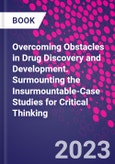Please Note: This is an On Demand product, delivery may take up to 11 working days after payment has been received.
Table of Contents
PrefaceKan He, Paul Frederick Hollenberg and Larry C. Wienkers
1. Learning to think critically
Brian Barnes
2. Leveraging ADME/PK information to enable knowledge-driven decisions in drug discovery and development
Larry C. Wienkers
3. Systems biology and data science in research and translational medicine
Karim Azer, Jeff S. Barrett, Mirjam Trame and Cynthia J. Musante
4. Drug Discovery and Development of ASO
Brooke Rock
5. Drug development of covalent Inhibitors
Upendra P. Dahal and Jan L. Wahlstrom
6. Denosumab: dosing and drug interaction challenges on the path to approval
Graham Jang
7. Discovery and development of ADCs: obstacles and opportunities
Hsuan Ping Chang, Yuen Kiu Cheung and Dhaval K. Shah
8. How to reduce risk of drug induced liver toxicity from the beginning
Jinping Gan, Kan He and W. Griffith Humphreys
9. Optimization for small volume of distribution leading to the discovery of apixaban
Kan He
10. Design, conduct, and interpretation of human mass balance studies and strategies for assessing metabolites-in-safety testing (MIST) in drug development
Simon G. Wong and Shuguang Ma
11. Conquering low oral bioavailability issues in drug discovery and development
Timothy J. Carlson
12. Case study of OATP1B DDI assessment and challenges in drug discovery and development-real-life examples
Hong Shen, Jinping Gan and Giridhar S. Tirucherai
13. Investigating the link between drug metabolism and toxicity
W. Griffith Humphreys
14. Overcoming nephrotoxicity in rats: the successful development and registration of the HIV-AIDS drug efavirenz (Sustiva?)
D.D. Christ
15. Disproportionate drug metabolites: challenges and solutions
Chandra Prakash
16. Disposition and metabolism of ozanimod-Surmounting the unanticipated challenge late in the development
Deepak Dalvie and Sekhar Surapaneni
17. Application of reaction phenotyping to address pharmacokinetic variability in patient populations
Robert S. Foti, Joseph M. Roesner and Joshua T. Pearson
18. Kyprolis (carfilzomib) (approved): a covalent drug with high extrahepatic clearance via peptidase cleavage and epoxide hydrolysis
Zhengping Wang, Jinfu Yang an Christopher Kirk
19. Engaging diversity in research: Does your drug work in overlooked populations?
Karen E. Brown and Erica L. Woodahl
20. PBPK modeling for Early clinical study decision making
Arian Emami Riedmaier
21. Integrated pharmacokinetic/pharmacodynamic/efficacy analysis in oncology: importance of pharmacodynamic/efficacy relationships
Harvey Wong
22. Predicting unpredictable human pharmacokinetics: Case studies from the trenches of drug discovery
Zheng Yang
23. ?Esmolol (soft drug design)
Paul W. Erhardt








